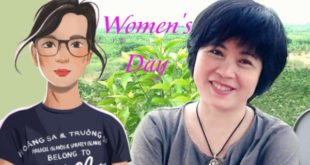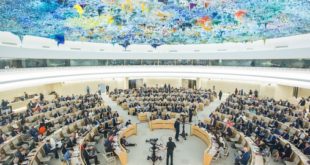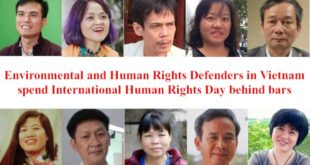PARIS, 31 August 2005 (VCHR) – The Vietnam Committee on Human Rights (VCHR) welcomes the release of four prisoners of conscience in an Amnesty on Vietnam’s National Day (2 September), i.e. Mennonite Pastor Nguyen Hong Quang, Roman Catholic priest Nguyen Thien Phung (aka Nguyen Viet Huan, member of the Congregation of the Mother Co-redemptrix), human rights defender Tran Van Luong and Mua San So, a Hmong protestant from the Northern Highlands. Two of the men, Father Nguyen Thien Phung and Tran Van Luong had been detained for almost 20 years in re-education camp.
Mr. Vo Van Ai, President of the Vietnam Committee on Human Rights commended the tireless efforts of governments and human rights organisations which helped significantly to bring about the release of these prisoners of conscience. “The designation of Vietnam as a “country of particular concern” by the United States for violations of religious freedom has led to the release of a number of religious prisoners.” The National Day’s Amnesty includes three religious prisoners, one of whom, Pastor Nguyen Hong Quang was on a list of prisoners also raised repeatedly by the European Union and EU member states.
However, Mr. Ai deplored the fact that all four men were detained for the peaceful exercise of their basic human rights – rights guaranteed in the Vietnamese Constitution – and should never have been arrested at all. Mr. Ai raised the tragic plight of Tran Van Luong, who has been on the UN list of “victims of arbitrary detention” since 1999, to the indifference of the Vietnamese authorities : “Tran Van Luong (aka Truong Van Lan) was just 45 when he was “caught red-handed distributing human rights leaflets” in 1985 in the streets of Ho Chi Minh City (cf. Saigon Giai Phong (Saigon Liberation), 25.9.1988) and condemned to death at an unfair trial in 1988. Detained under inhumane conditions in the notorious T5, Thanh Cam re-education camp, routinely detained in solitary confinement and deprived of medical care, he leaves prison today an old man, his health completely broken. Vietnam has stolen 20 years of Tran Van Luong’s life, simply because he committed the “crime” of advocating human rights. Today, the government is releasing him, just three months before the end of his 20-year sentence (due on 9 December 2005) and brazenly claiming that he is benefiting from the “clemency” of the Vietnamese regime. Vietnam’s attitude is shameful. It makes a mockery of its obligations to uphold international human rights standards and norms”.
After reading about Tran Van Luong’s death sentence in a two-line news item in the Vietnamese press, the Vietnam Committee on Human Rights launched a campaign for his release and that of two UBCV monks, Thich Tue Sy and Thich Tri Sieu (aka Le Manh That), also condemned to death in 1988. Thanks to international pressure, including direct interventions by the governments of Sweden, the UK and Australia, their sentences were commuted to 20 years in prison in 1989.
In September 1999, the United Nations Working Group on Arbitrary Detention declared Tran Van Luong to be a victim of arbitrary detention (Opinion 13, 1999) in violation of Article 19 of the UN International Covenant on Civil and Political Rights on the right to freedom of expression, and called for his immediate release. UN Special Rapporteur on Torture, Sir Nigel Rodley also condemned the “inhumane” detention conditions suffered by Tran Van Luong in T5 re-education camp, Thanh Cam in Thanh Hoa province in his report to the UN Commission on Human Rights in 1998. He reported that Tran Van Luong was suffering from serious liver and stomach complaints for which he was denied medical care, and was forced to perform hard labour in spite of his poor health.
The Vietnam Committee on Human Rights is concerned that many prisoners of conscience are detained today under extremely harsh conditions in Vietnam’s prisons and re-education camps. Buddhist monk Thich Thien Minh, released in February 2005 after 26 years in detention, reports that many religious prisoners and political prisoners remain detained in Vietnam’s prisons and re-education camps. He provided the Vietnam Committee on Human Rights with a list of 62 prisoners of conscience in Z30A reeducation camp in Xuan Loc, Dong Nai province. In a report to the Vietnam Committee on Human Rights, Thich Thien Minh wrote :
“For example, there is Father Pham Minh Tri – he has suffered from dementia for the past 10 years, but they still keep him in the camp – and Father Nguyen Duc Vinh of the Congregation of the Mother Co-redemptrix. Both these men have been detained for the past 18 years, yet they have still not been released. There is also an old man belonging to a branch of the Hoa Hao Sect (Buu son Ky huong). His name is Ngo Van Ninh. He is 87 years old, and walks with a stick. He is terribly weak and in very poor health, yet they keep him locked in the camp. There are so many elderly political prisoners in Z30A camp, 70-80 year-old men who came into the camp as strong, healthy youths with heads of shining black hair. Now their hair has turned white, their bodies are bent, yet they are still detained. Even if they are released one day, they will be just like walking skeletons, good for nothing, just an extra burden for their families”.
Other religious prisoners cited by Thich Thien Minh in Z30A camp include Roman Catholic Priest Father Nguyen Viet Quan, detained for over 18 years, Buddhist monk Thich Thien Tam, Hoa Hao Buddhists Le Van Chuong and Le Van Tinh etc..
This post is also available in: French Vietnamese
 Quê Me Quê Me: Action for democracy in Vietnam & Vietnam Committee on Human Rights
Quê Me Quê Me: Action for democracy in Vietnam & Vietnam Committee on Human Rights




